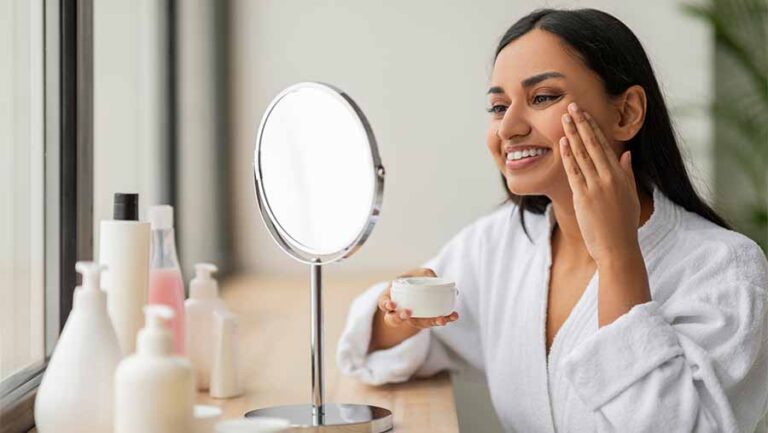
Is the innocence of childhood alive today? I doubt it. In the past, you would see many teen girls with scraped knees and messy hair.
But today? By the time a girl turns 13, she is already taught that her power lies in her “sex appeal”.

When she is flipping Instagram or scrolling TikTok. When she is watching movies, videos, or web series. When she is looking at magazines or billboards. There is one silent message being fed to their minds:
“Be sexy. Be hot. That’s how you will be loved. That’s how you will be seen.”
Is it just media influence? No. It is a full-blown social experience. It is a silent and invisible education system run by society.
Society is directly or indirectly telling teen girls to focus on looks, likes, mini-skirts, and low-cut tops. It is influencing teen girls that if you are not turning heads, you are invisible.
But invisible to whom? And why should that even matter?
Let’s dive deeper into this manipulation and what it is costing teenage girls.
Social Conditioning of Teen Girls Through Media and Entertainment
Teen girls today are growing up in an environment where media and pop culture rules. These are silently dictating to girls what it means to be “worthy” or “desirable”.
If you try to find a pattern, you will see that there is one common factor in music videos, films, advertisements, and social media trends. They all show a distorted image of success and attractiveness. And they do it by showing flawless skin, curvy yet slim bodies, and hypersexual behavior.
In media and entertainment, young girls are dressed and styled to look older. They are taught to walk, stand, and pose in clothes that are meant to attract attention.
These mediums hardly talk about or show that teen girls should be known for their talent, intelligence, or individual personality. Instead, they are focusing more on their appearance.
Even female characters in cartoons or teen shows are often shown with unrealistic bodies and revealing outfits. It sends a strong message to teen girls: to be noticed, you need to be desirable.
Girls are seeing these representations daily and it is shaping how they perceive themselves. They start believing that beauty and sexual appeal are the most powerful tools they have. This is not just a result of exposure, it is social conditioning.
Over time, this conditioning limits teen girls’ sense of identity. They question their true interests, talents, or values. Because they feel compelled to the dominant media and entertainment narrative just to fit in.
If they don’t do it, they risk being labeled as “boring” or “insecure”.
How Social Media Pressure Affects Them
Social media platforms are not just a medium to connect with other people, they are engineered in a way to shape human behavior also.
Social media algorithms are known to boost content that is engaging. So when a teen girl posts a photo or video—every like and comment becomes a vote of her worth.
In reality, when a girl posts a cute selfie, she gets a few likes. But when she posts something revealing, bold, or seductive, she gets more likes. Not only followers, but even strangers comment on her content. The more she does it, the more algorithm boosts it.
Every day, young girls compete with other girls, influencers, and trends to look more beautiful. If they don’t, algorithms don’t reward them. So they try to become “prettier” or “sexier” by posting suggestive selfies and following unrealistic beauty standards. Otherwise, they will lose the game of being more “popular”.
Over time, this conditions teen girls to equate validation with visibility. This digital validation loop is dangerous. Girls begin to think that their bodies are their brand, and their beauty is their currency.
Performance wins over self-expression. And social media algorithms win by training these young girls to craft crowd-pleasing posts day in, and day out.
The Trap of Marketing and Capitalism
In today’s capitalist system, companies are desperate to sell more and more products. And the most powerful way to sell is through using people’s emotions.
Marketers have learned that if they make teen girls feel insecure about their appearance, they can sell them solutions. Use these cosmetics for makeup. Wear these trendy and in-demand clothes. You need these beauty treatments. Why don’t you try cosmetic surgeries to enhance your face or body parts? And the list is long.
Since their childhood, girls have been watching a lot of ads. Most of these ads have one inherent message: If you want to be accepted, you need to look hot, desirable, or flawless. What makes it worse is that marketers are smart people. They sell everything to young girls in the name of empowerment. Brands use slogans like “Be confident” or “Love your body”.
But the images and videos still show unrealistic “air-brushed” beauty standards and sexualized poses.
The capitalist system is not a saint. They want to change the behavior of people, here teen girls, for their own profit. That’s why they are not promoting real confidence. And what it means by real empowerment. Due to a lack of real knowledge and awareness, teen girls start believing that, “If I don’t look pretty, people won’t notice me.”
Also, marketers and companies hire social media influencers to target teens and promote different beauty ideals. The more pressure girls feel to meet these ideals, the more they spend on products. Companies win and girls lose.
The Role of Cultural Norms and Patriarchy
Cultural norms and patriarchy work together. You can’t see it but it is there.
Patriarchy sets the standard and cultural norms reinforce it. As patriarchy has always been centered around male desire and control, they have been grooming women to value their appearance, especially their sexual appeal to men.
If we observe deeply, we can see that the above is true in many societies worldwide. Like in Indian traditions, a girl is supposed to be a “sanskari” (cultured) girl. On one hand, girls are praised for being soft-spoken, obedient, and respectful, but on the other hand, there is immense societal focus on beauty and body. When you look at the matrimonial ads in India, they all are looking for a girl who has fair skin, long hair, slim waist, and feminine grace.
The same is true for women and girls around the world, whether in Eastern societies or Western societies.
The patriarchal system is very cunning. They maintain a confusing double standard. Their message to girls is:
- Be attractive, but not too bold.
- Be desirable, but not demanding.
They pass down this message through families, schools, festivals, marriage customs, and praise (e.g. beauty pageants, and proms).
Culture then normalizes these patriarchal values through media, fashion, advertising, music, and social media. It sells the idea that “sexy” is not just desirable, it is expected. There are repeated messages:
- Your body is your main asset.
- Be confident” really means “Be hot.
- “Be empowered” often just means “Be desirable to men.”
- Your validation lies in likes, followers, and compliments—usually from men and boys.
These messages are repeated so often that no one questions them. They become the air teen girls breathe.
Lack of Awareness and Education
Teen girls are being conditioned and will keep being conditioned because there is a lack of proper awareness and education. Families come first and then schools. But both are failing to teach girls the right things about life.
Many girls are growing up without understanding the real difference between confidence and objectification. If they look “pretty”, they get more praise than when they are thoughtful, kind, creative, or bold. So they learn to tie their self-worth around their appearance.
At the same time, adults around them often remain unaware of how society and media subtly encourage girls to “look sexy.”
In schools, there is little or no discussion about body image, media influence, the importance of self-respect, and personal boundaries. Only a few schools may have started talking about it recently—especially in developed countries.
If some schools take the initiative to talk about sex education, it is often mechanical or fear-based. Sex education should focus more on emotional safety and what the word “consent” means. Schools should have an atmosphere where girls don’t shy to ask critical questions like:
- Why do they feel pressured to dress a certain way?
- Why shouldn’t they act sexy?
- Why shouldn’t they seek online validation?
- How do media and trend influence their self-image?
Teen girls need adults with whom they can have open conversations. They need teachers who can guide them. They need more and more strong women role models to inspire them. Due to the lack of these, girls are left to learn from TikTok trends, Instagram filters, movies or TV series, and music videos.
But the problem with these mediums is that they all sell fantasies, not truth.
If we really want to protect girls, we should start educating them from an early stage. Educate them about real self-worth. Educate them about media manipulation. Educate them about healthy relationships. Only then can they differentiate between self-expression and exploitation.
Make young girls aware and empowered, and they will break the cycle of sexualization.
Cover Photo by amin naderloei on Unsplash
2025 © staging.socialexperiencehub.com. All rights reserved.






